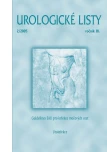-
Medical journals
- Career
URINARY TRACT INFECTIONS IN CHILDREN AND DURING PREGNANCY
Authors: J. Kliment; J. Svitač
Authors‘ workplace: Urologická klinika JLF UK a MFN, Martin
Published in: Urol List 2005; 3(2): 34-38
Overview
Urinary tract infections (UTI) are one of the most common diseases in the infantile age. Clinical picture of UTI in newborn has its specific manifestations, different from the symptomatology in older children. In adverse circumstances (delayed treatment, inadequate therapy, complicating organic and functional changes of urinary tract), the infection may leave permanent consequences, developing the scars in renal parenchyme. At the progression of renal damage, the affected children are in danger of the development of hypertension in later age, at the bilateral process the condition may lead to chronic renal insufficiency. The diagnostics and the treatment of UTI in the newborn age often requires interdisciplinar cooperation between neonatologist, pediatric nephrologist and pediatric urologist. In the work we present an overview of the basic views on the ethiopathogenesis, diagnostics and the treatment of UTI in children. Urinary tract infections are a frequent complication of pregnancy. It is necessary to provide an early diagnostics and treatment to avoid the possible impairment of mother and fetus.
KEY WORDS:
children, infection, urinary tract
Sources
1. Adler-Shohet FC, Cheung MM, Hill M, Lieberman JM. Aseptic meningitis in infants younger than six months of age hospitalized with urinary tract infections. Pediatr Infect Dis J 2003; 22 : 1039-1042.
2. Ashouri N, Butler J, Vargas-Shiraishi OM, Singh J, Arrieta A. Urinary tract infection in neonates: How aggresive a workup and therapy? Infect Med 2003; 20(2): 98-102.
3. Avery GB, Fletcher MA, MacDonald MG. Acute infection. In: Frei BJ, McCracken GH Jr. Neonatology. Philadelphia: Lippincott Wiliams 1999 : 1189-1230.
4. Bláhová K, Janda J. Akutní pyelonefritida v kojeneckém a batolecím vìku. Čes Slov Pediat 2004; 59(3): 136-139.
5. Gearhart JP, Rink RC, Mouriquand PDE. Pediatric urinary tract infections. In: Shortliffe LMD. Pediatric Urology. Philadelphia: W. B. Sunders Company 2001 : 237-258.
6. Hellerstein S. Long term consequences of urinary tract infection. Curr Opin Pediat 2000; 12(2): 125-128.
7. Hellerstein S. Urinary tract infections in children: Pathophysiolgy, risk factors and management. Infect Med 2002; 19(12): 554-560.
8. Chaliha C, Stanton SL. Urological problems in pregnancy. BJU International 2002; 89 : 469-476.
9. Larcombe J. Urinary tract infection in children. BMJ 1999; 319 : 1173-1175.
10. Leibowitz E. Neonatal candidiosis: Epidemiologic, clinical and therapeutic aspects. Infect Med 2003; 20(10): 494-498.
11. Linshaw MA. Controversies in childhood urinary tract infection. World J Urol 1999; 17 : 383-395.
12. Nuutinen M, Uhari M. Recurremce and follow-up after urinary tract infection under the age of 1 year. Pediatr Nephrol 2001; 16 : 69-72.
13. Svitač J, Kliment J, Zibolen M. Diagnostika akútnej pyelonefritídy v detskom veku. Scripta medica Brunensis 1996; 70(Suppl 4): 336-338.
14. Svitač J. Vezikorenálny reflux u novorodenca. Čes Slov Pediat 2000; 55(7): 432-436.
15. Pisarčíková M, Kurák M. Odporúčania pre liečbu ažkej sepsy u detí. Medicínsky monitor 2004; 6 : 10-11.
16. Zibolen M et al. Praktická neonatológia. Martin: Vydavateľstvo Neografie 2001.
17. Watson AR. Pediatric urinary tract infection. EAU Update Series 2004; 2 : 94-100.
Labels
Paediatric urologist Urology
Article was published inUrological Journal

2005 Issue 2-
All articles in this issue
- Non- complicated uroinfections - what is new and what has changed
- COMPLICATED UROINFECTIONS: WHAT IS NEW AND WHAT HAS CHANGED
- URINARY TRACT INFECTIONS IN CHILDREN AND DURING PREGNANCY
- Mycotic infections
- Urogenitary tuberculosis early the third century
- Sexually transmitted disease from the urologist's point of view
- CHRONIC PELVIC PAIN
- Septic shock at uroinfections
- The principles of antimicrobial treatment in uroinfections
- Urological Journal
- Journal archive
- Current issue
- Online only
- About the journal
Most read in this issue- Mycotic infections
- URINARY TRACT INFECTIONS IN CHILDREN AND DURING PREGNANCY
- Septic shock at uroinfections
- Non- complicated uroinfections - what is new and what has changed
Login#ADS_BOTTOM_SCRIPTS#Forgotten passwordEnter the email address that you registered with. We will send you instructions on how to set a new password.
- Career

